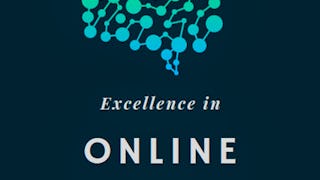Are you an educator? Have you ever wanted to understand more about how to design your class to make better use of educational technology – whether fully online or in blended contexts? Would you like to learn from those who have extensive practical experience with online technologies?



Learning to Teach Online


Instructors: Associate Professor Simon McIntyre
193,351 already enrolled
Included with 
(3,161 reviews)
Details to know

Add to your LinkedIn profile
See how employees at top companies are mastering in-demand skills


Earn a career certificate
Add this credential to your LinkedIn profile, resume, or CV
Share it on social media and in your performance review

There are 5 modules in this course
'Module 1: Why is Online Teaching Important' is about understanding where you are in the current educational landscape, and determining where you want to be. We will explore why online teaching is relevant to your teaching practice, and you’ll have an opportunity to reflect upon the opportunities and challenges you face in your own context. 'Module 2: Open and Institutionally Supported Technologies' focuses on helping you understand the benefits and restrictions of both broad categories of technologies. We’re all familiar with different social media technologies, and many of us will be aware of larger institutional online learning systems. In this module we will ask you to think about the reasons why you might want to use freely available online tools for your teaching - or your institution's learning management system. Important considerations such as which types of technologies are suitable for a range of different activities will also be explored.
What's included
12 videos6 readings1 peer review5 app items2 discussion prompts
'Module 3: Planning Online Learning' will explore the importance of planning online learning from a pedagogical perspective rather than a technology driven one. Careful planning is one of the most important aspects of teaching online, and success often depends upon taking the time to consider all of the different aspects of the online learning experience before you begin. The content and activities will explore the concepts of constructive alignment, choosing which aspects of a class are best done online or face-to-face, building digital literacy capabilities within your students, and examining your own motivations for wanting to teach online in the first place. 'Module 4: Online Learning Activities' will identify important considerations you need to keep in mind when developing online learning activities for your students. We will offer advice about how to plan an online activity, and help you think about which may be appropriate for your own students. When you are new to the process, understanding which online technology best supports different learning activities can be daunting. This module, along with a range of case studies, and activities, will explore the relationship between different technologies and specific activities in more depth.
What's included
16 videos2 readings5 app items2 discussion prompts
'Module 5: Online Assessment Strategies' discusses the notions of formative and summative assessment in online contexts. We will also explore benefits and considerations that you'll need to keep in mind if you're considering adopting an online assessment strategy in your own teaching, and how using technology can improve the efficiency and effectiveness of the assessment process. 'Module 6: Online Resources' discusses the benefits of using open educational resources (OER), and other online resources in your classes. We will also identify issues to be aware of when using resources that you discover, in terms of licensing and Creative Commons. You will be given the chance to explore several examples of online resources via the activities and associated resources for the module. How to evaluate the effectiveness and appropriateness of resources you find online is also explored.
What's included
11 videos2 readings5 app items2 discussion prompts
'Module 7: Engaging and Motivating Students' explores various strategies for engaging and motivating your students in a range of different online learning scenarios. It discusses the important roles that curriculum design, activity structure, the relevance of the chosen technology, and effective time management play in creating an enthusiasm for learning in your students. 'Module 8: Evaluation Strategies' examines the importance of evaluating your online teaching practice to ensure that it is effective, and to give you an opportunity to constantly improve. This is especially important when you are first developing an online teaching practice, or when you are trying something new for the first time. We will explore an evaluation strategy based upon four reflective angles: self reflection, peer observations, student feedback, and theory. The module also introduces the concept of learning analytics as an informative tool to enable up to the minute evaluation of your online class.
What's included
19 videos2 readings1 peer review5 app items2 discussion prompts
Simon and Negin answered the top questions asked of them in previously run versions of this course via video. Although from previous courses, the questions raised and the discussions that follow, are very relevant, and they may answer some questions that you have about the course. In the videos Simon and Negin, did reference learners' names and the week in the course, but this is not important in this version of the course. These Q&A videos have been collated according to their relevance to the Modules of the course.
What's included
54 videos
Instructors


Explore more from Education


Macquarie University


University of Leeds


Johns Hopkins University


The University of Edinburgh
Why people choose Coursera for their career




Learner reviews
3,161 reviews
- 5 stars
80.80%
- 4 stars
15.52%
- 3 stars
2.08%
- 2 stars
0.72%
- 1 star
0.85%
Showing 3 of 3161
Reviewed on May 22, 2020
A very good course for digital learning experiences. This course will be useful for beginners who want to Teach Online. Finally, this course transforms a Better teacher into a Smart teacher.
Reviewed on Jun 21, 2020
it really helped me in understanding online teaching in depth and also provided better understanding in context of using online content and resources in context of terms and conditions of use.
Reviewed on May 22, 2020
The topics discussed in this course is very helpful and very practical. Personally, it makes me think more about what a great teacher should do in order to prepare our teachings. Thank you, UNSW.

Open new doors with Coursera Plus
Unlimited access to 10,000+ world-class courses, hands-on projects, and job-ready certificate programs - all included in your subscription
Advance your career with an online degree
Earn a degree from world-class universities - 100% online
Join over 3,400 global companies that choose Coursera for Business
Upskill your employees to excel in the digital economy
Frequently asked questions
Access to lectures and assignments depends on your type of enrollment. If you take a course in audit mode, you will be able to see most course materials for free. To access graded assignments and to earn a Certificate, you will need to purchase the Certificate experience, during or after your audit. If you don't see the audit option:
The course may not offer an audit option. You can try a Free Trial instead, or apply for Financial Aid.
The course may offer 'Full Course, No Certificate' instead. This option lets you see all course materials, submit required assessments, and get a final grade. This also means that you will not be able to purchase a Certificate experience.
When you purchase a Certificate you get access to all course materials, including graded assignments. Upon completing the course, your electronic Certificate will be added to your Accomplishments page - from there, you can print your Certificate or add it to your LinkedIn profile. If you only want to read and view the course content, you can audit the course for free.
You will be eligible for a full refund until two weeks after your payment date, or (for courses that have just launched) until two weeks after the first session of the course begins, whichever is later. You cannot receive a refund once you’ve earned a Course Certificate, even if you complete the course within the two-week refund period. See our full refund policy.
More questions
Financial aid available,

